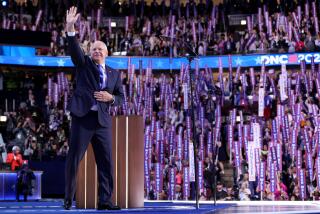Pawlenty, Romney bash Obama at CPAC
Reporting from Washington — On a seeming collision course toward the 2012 Republican presidential nomination, Tim Pawlenty and Mitt Romney spoke to cheering crowds Friday at the second day of a gathering of the nation’s conservatives, blasting President Obama for what they said was his failure to lead on national security and the economy.
While Pawlenty, the former governor of Minnesota, and Romney, the former Massachusetts governor, have not formally declared their intentions, their White House ambitions appear more evident every day.
Romney’s wife, Ann, introducing him to the packed house at the Conservative Political Action Conference, came close to an admission, saying that she “hoped” to see her husband elected. And when Romney, who has been on a nationwide tour, said at one point “if I decide to run for president,” some in the room chortled.
But neither Pawlenty nor Romney, nor any of the other featured speakers here Friday, which included possible 2012 contenders Sen. John Thune (R-S.D.) and Republican Gov. Rick Perry of Texas, could compete with the rowdy reception given Rep. Ron Paul, the Texas libertarian.
Paul, an isolationist Republican who advocates eliminating the Federal Reserve, was cheered by a raucous, whistling crowd. His supporters have flooded CPAC in recent years, and last year Paul won the presidential straw poll there.
“There is truly a revolution going on in this country,” Paul said. “We don’t need to just change political parties; we need to change our philosophy of what this country is all about.”
The speeches came on the same day Fox News released a poll showing that Obama would defeat any of the well-known potential GOP candidates in the field, including former Arkansas Gov. Mike Huckabee and former Alaska Gov. Sarah Palin, who aren’t attending the conference.
Obama would defeat Palin in a head-to-head matchup by more than 20 points, the poll results indicated. Only Romney and Huckabee came within 8 points of the president.
Romney, who famously ended his 2008 bid here three years ago, told a packed hotel ballroom that “an uncertain world has been made more dangerous by the lack of clear direction from a weak president.”
Obama’s “proposed policy of engagement with Iran and North Korea won him the Nobel Peace Prize,” Romney said. “How’s that worked out? Iran armed Hezbollah and Hamas and is rushing toward nuclear weapons. North Korea fired missiles, tested nukes, sunk a South Korean ship and shelled a South Korean island.”
Strikingly, even as protesters in Cairo celebrated the departure of Egyptian President Hosni Mubarak, Romney did not mention the crisis. He had been the first potential 2012 candidate to call for Mubarak’s exit.
Pawlenty also suggested Obama had been weak on foreign affairs and had not stood up to “Iran, Russia, and our adversaries in the Middle East, including Hamas and the Muslim Brotherhood,” the Islamic political movement in Egypt.
“Bullies respect strength, not weakness,” Pawlenty said. “So when the United States of America projects its national security interests here and around the world, we need to do it with strength.”
On the economy, Romney accused Obama of a lack of focus. “The president who took office on Jan. 20, 2009, should have had one central mission — put Americans back to work; fight for every job,” he said.
Romney was met by a supportive, if not wildly enthusiastic, crowd. Tellingly, he scarcely mentioned the healthcare overhaul legislation, a popular target at the conference; he was an architect of a similar bill when he was governor of Massachusetts.
Instead, Romney stayed with what is likely to be the core message of his presidential campaign: that he has unmatched experience in economic matters given his work as a businessman, venture capitalist and organizer of the 2002 Olympics.
Pawlenty, unlike some other potential 2012 candidates, has a compelling personal story. He detailed how as a teenager in a blue-collar family in St. Paul, Minn., his mother died and his father lost his job at a trucking company.
“At a young age, I saw up close the face of loss, the face of hardship, the face of losing a job, and I saw in the mirror something else: the face of a very uncertain future,” he said. “I know Americans are feeling that way today. I know that feeling — I’ve lived it.”
Paul West in the Washington Bureau contributed to this report.
More to Read
Sign up for Essential California
The most important California stories and recommendations in your inbox every morning.
You may occasionally receive promotional content from the Los Angeles Times.










